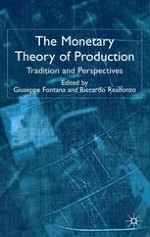
2005 | OriginalPaper | Buchkapitel
Introduction: The Monetary Theory of Production
verfasst von : Giuseppe Fontana, Riccardo Realfonzo
Erschienen in: The Monetary Theory of Production
Verlag: Palgrave Macmillan UK
Aktivieren Sie unsere intelligente Suche, um passende Fachinhalte oder Patente zu finden.
Wählen Sie Textabschnitte aus um mit Künstlicher Intelligenz passenden Patente zu finden. powered by
Markieren Sie Textabschnitte, um KI-gestützt weitere passende Inhalte zu finden. powered by
On 10 October 1932 Keynes resumed the Michaelmas term at King’s College in Cambridge with a new title for his lectures; namely, The Monetary Theory of Production’. At around that time, Keynes used the same title for a contribution to a Festschrift for Arthur Spiethoff (Keynes, 1933). In this short paper Keynes discusses the difference between a real-exchange economy and a monetary economy, the distinction being that in the latter, but not in the former, money plays an essential role in the determination of the aggregate level of output and employment. According to Keynes, the lack of understanding of this non-neutral role of money is at the root of many problems in economics. In particular, the failure of the economic discipline to provide satisfactory explanations and solutions to real world problems, such as economic crises, is due to the lack of a theory for a monetary economy; what Keynes termed a monetary theory of production (MTP):
In my opinion the main reason why the problem of crises is unsolved, or at any rate why this theory is so unsatisfactory, is to be found in the lack of what might be termed a
monetary theory of production
. The distinction which is normally made between a barter economy and a monetary economy depends upon the employment of money as a convenient means of effecting exchanges — as an instrument of great convenience, but transitory and neutral in its effect. It is regarded as a mere link between cloth and wheat… It is not supposed to affect the essential nature of the transaction from being, in the minds of those making it, one between real things, or to modify the motives and decision of the parties to it. Money, that is to say, is employed, but is treated as being in some sense
neutral
… That, however, is not the distinction which I have in mind when I say that we lack a monetary theory of production. An economy, which uses money but uses it merely as a neutral link between transactions in real things and real assets and does not allow it to enter into motives or decisions, might be called — for want of a better name — a
real exchange economy
. The theory which I desiderate would deal, in contradistinction to this, with an economy in which money plays a part of its own and affects motives and decisions and is, in short, one of the operative factors in the situation, so that the course of events cannot be predicted, either in the long period or in the short, without a knowledge of the behaviour of money between the first state and the last. And it is this which we ought to mean when we speak of
a monetary economy
. (Keynes 1933, pp. 408–9; italics in original)